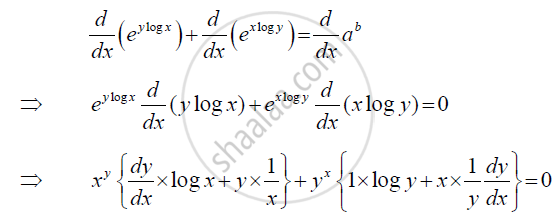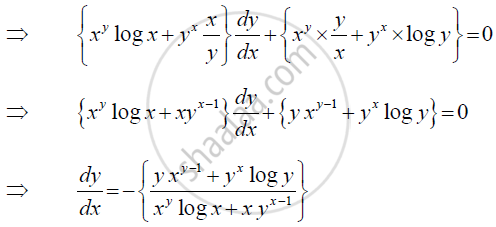Advertisements
Advertisements
प्रश्न
if `x^y + y^x = a^b`then Find `dy/dx`
उत्तर
Given that,
`x^y + y^x = a^b`
=> `e^(ylogx) + e^(xlogy) = a^b`
On differentiating both sides with respect to x, we get


APPEARS IN
संबंधित प्रश्न
If \[f\left( x \right) = x^3 + 7 x^2 + 8x - 9\]
, find f'(4).
Find `(dy)/(dx)` if `y = sin^-1(sqrt(1-x^2))`
If x = tan-1t and y = t3 , find `(dy)/(dx)`.
If y = `sqrt(cosx + sqrt(cosx + sqrt(cosx + ... ∞)`, then show that `"dy"/"dx" = sinx/(1 - 2y)`.
Find `"dy"/"dx"`, if : x = sinθ, y = tanθ
Find `"dy"/"dx"`, if : `x = cos^-1((2t)/(1 + t^2)), y = sec^-1(sqrt(1 + t^2))`
Find `"dy"/"dx"` if : x = a cos3θ, y = a sin3θ at θ = `pi/(3)`
If y = `e^(mtan^-1x)`, show that `(1 + x^2)(d^2y)/(dx^2) + (2x - m)"dy"/"dx"` = 0.
If x2 + 6xy + y2 = 10, show that `(d^2y)/(dx^2) = (80)/(3x + y)^3`.
Find the nth derivative of the following : `(1)/(3x - 5)`
Choose the correct option from the given alternatives :
If y = sin (2sin–1 x), then dx = ........
Choose the correct option from the given alternatives :
If y = `tan^-1(x/(1 + sqrt(1 - x^2))) + sin[2tan^-1(sqrt((1 - x)/(1 + x)))] "then" "dy"/"dx"` = ...........
Choose the correct option from the given alternatives :
If x = a(cosθ + θ sinθ), y = a(sinθ – θ cosθ), then `((d^2y)/dx^2)_(θ = pi/4)` = .........
Differentiate the following w.r.t. x : `tan^-1[sqrt((sqrt(1 + x^2) + x)/(sqrt(1 + x^2) - x))]`
If `x = e^(x/y)`, then show that `"dy"/"dx" = (x - y)/(xlogx)`
If y = Aemx + Benx, show that y2 – (m + n)y1 + mny = 0.
Find `"dy"/"dx"` if, x3 + y3 + 4x3y = 0
Find `"dy"/"dx"` if, xy = log (xy)
Choose the correct alternative.
If y = 5x . x5, then `"dy"/"dx" = ?`
Choose the correct alternative.
If ax2 + 2hxy + by2 = 0 then `"dy"/"dx" = ?`
If y = `("x" + sqrt("x"^2 - 1))^"m"`, then `("x"^2 - 1) "dy"/"dx"` = ______.
If `"x"^"a"*"y"^"b" = ("x + y")^("a + b")`, then show that `"dy"/"dx" = "y"/"x"`
Find `"dy"/"dx"` if x = `"e"^"3t", "y" = "e"^(sqrt"t")`.
If x2 + y2 = 1, then `(d^2x)/(dy^2)` = ______.
State whether the following statement is True or False:
If `sqrt(x) + sqrt(y) = sqrt("a")`, then `("d"y)/("d"x) = 1/(2sqrt(x)) + 1/(2sqrt(y)) = 1/(2sqrt("a"))`
If y = y(x) is an implicit function of x such that loge(x + y) = 4xy, then `(d^2y)/(dx^2)` at x = 0 is equal to ______.
Find `dy/dx` if, `x = e^(3t), y = e^(sqrtt)`
Find `dy/(dx) "if" , x = e^(3t), y = e^sqrtt`.
If log(x + y) = log(xy) + a, then show that `dy/dx = (-y^2)/x^2`
